College student eating disorders are on
the rise. Here’s

the rise. Here’s
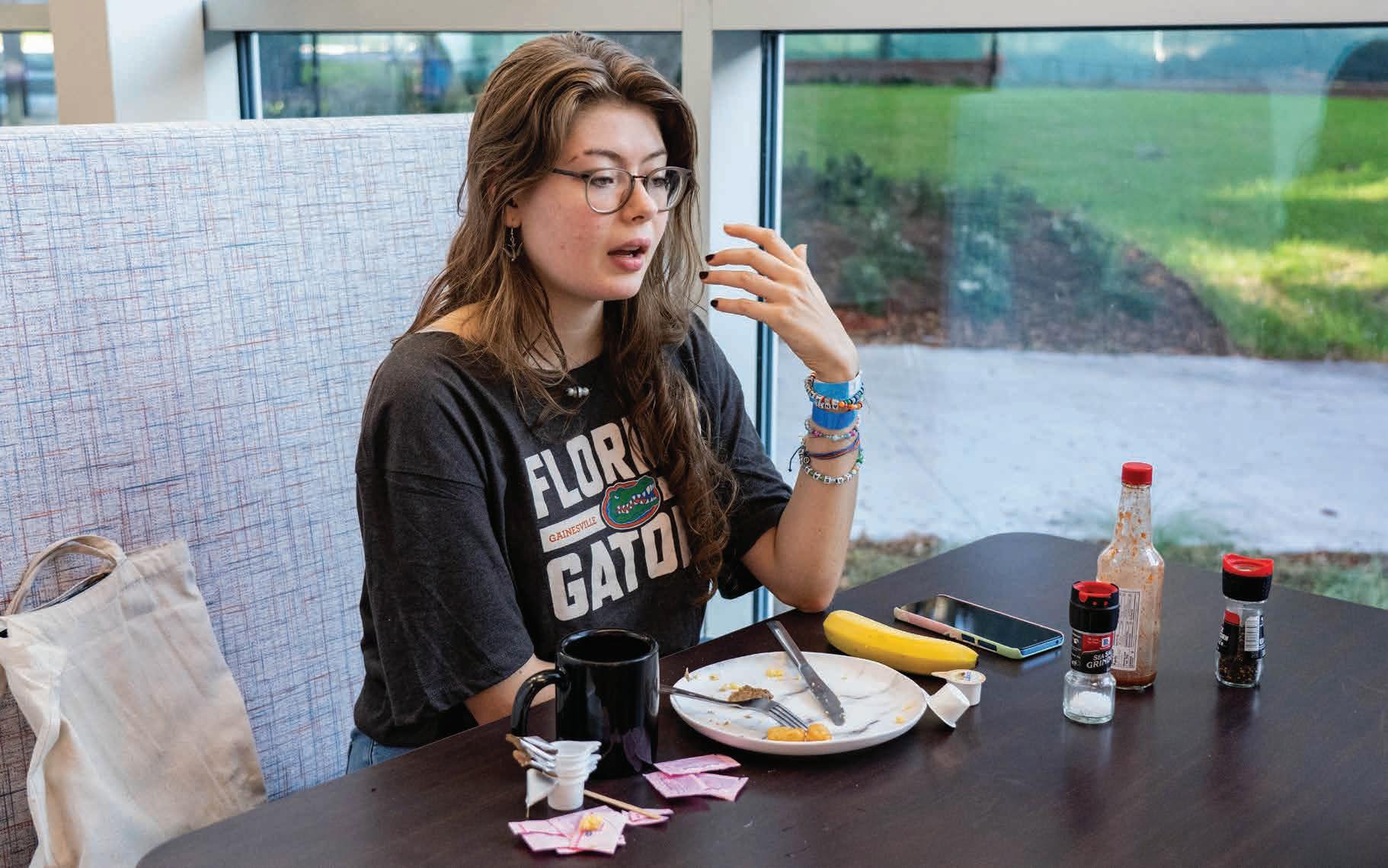
billions in bets roll in
By Natalie Kaufman Alligator Staff Writer
Choosing the leader of the free world can be a gamble. Some take this literally, the most deep-pocketed among them wagering seven figures on presidential nominees.
NBC reported last week that a French trader bet $28 million on a
Donald Trump victory. If the former president wins, so does the bettor, to the tune of $46 million.
This phenomenon has captured Gen Z's attention. At UF, politically engaged Gators track election prediction markets.
Some experts, including UF political science assistant professor Cassidy Reller, hope gambling will

propel young people, who are otherwise low-propensity voters, to the polls.
“People that aren’t engaged with voting because they find it boring might find it more fun if they can bet on that, make money on that,” Reller said.
By Zoey Thomas Alligator Staff Writer
As a high school freshman, Alexa Larson’s every thought was occupied by her weight.
“I didn’t have time for friends. I didn’t have time for activities,” Larson said. “I didn’t really have any goals in life other than to get through the day and wake up lighter than I had before.”
A three-month stint in an Oklahoma residential center gave Larson her life and personality back from her eating disorder that first arose in middle school, she said. Now, the 20-year-old UF advertising junior freely eats former “fear foods” like peanut butter and dedicates more time to theater than the gym.
When Larson got to UF, she was surprised by how often classmates talked about dieting and weight loss, she said. Knowing where the end of that “pointless” road led, she avoided it.
But not everyone arrives at university with that lesson already learned. As a result, college has long proved a catalytic time for developing eating disorders — illnesses of obsession with food that may take the form of anorexia, bulimia or binge eating.
Since 2013, eating disorders on campus have risen steadily.
About 17% of college women and 10% of men were identified as likely to have one in the Healthy Minds Survey for 2023. The
figure was over seven percentage points lower for both groups 10 years ago.
Larson would offer any classmate struggling with an eating disorder a simple warning, she said. “You can try,” she said. “But it's either gonna end up with you being dead or going back to your original set [weight] point.”
Self-image outside appearance
College is a prime time for people to start heavily comparing their bodies to their peers, UF clinical and health psychology associate professor Rebecca Pearl said. Young adults have a high risk of developing “internalized weight stigma,” Pearl’s primary research focus.
People with poor body image don’t like their body, but people with internalized weight stigma don’t like themselves because of their body, Pearl said.
“Even though they can recognize that they're successful in their careers … because they cannot control their weight, they feel like a total failure in life,” Pearl said. “They feel worthless, they don't know why their loved ones are with them. It's really this deep-seated self-loathing.”
To combat the phenomenon, Pearl recommends looking to places other than one’s appearance for self-esteem.
Research is unclear whether losing weight actually reduces internalized stigma, she said. So, instead of following fad diets, she advocates focusing on school, friends and hobbies and practicing self-compassion to heal a damaged relationship with food.


By Avery Parker Alligator Staff Writer
Across Florida, universities share the existence of student government. Though most share a structure that mirrors the United States government, not all student governments look the same structurally or culturally.
Florida State University
Florida State University’s Student Government Association is composed of an executive branch, a student senate and a supreme court. Unlike UF, FSU SGA also includes a Congress of Graduate Students, which serves to enhance the university experience for postgraduates; a Campus Recreation Board, which focuses on recreation facilities and programs; and a Student Union Board, which manages FSU’s student union.
FSU SGA also differs from UF SG in that its Fall and Spring elections are exclusively conducted through an online ballot system. Additionally, UF’s SG budget is around $24 million, whereas FSU’s is approximately $14 million, which is separate from its Congress of Graduate Students’ $1.2 million budget.
Speaker of the Congress of Graduate Students Jack Rowan, a 22-year-old FSU law student, said that while FSU and UF student governments are structurally similar, their political cultures are starkly different. Rowan described FSU’s SGA political climate as passive to the point of excess.
“There isn’t even that airing of political differences,” he said. “A lot of it is very ‘Let’s have a conversation, let’s do this behind closed doors.’”
According to Rowan, SGA members are hesitant to rely on courts or public debates in settling political issues. He said senators themselves are unlikely to pass legislation, or even vote on it unless they know beforehand that it will have strong support across both the legislative and executive branches.
“The problem is…there’s not really a point where people are willing to say talking has stopped working,” Rowan said. “If the talking doesn’t work, you’re encouraged to just keep talking, and talking into the abyss basically.”
Rowan said the differences between FSU’s ruling Forward Party and the minority Surge Party are minimal, with both parties dedicated to political cooperation and improving the student experience
at the university. But there are some distinctions between them. For instance, Surge sought to add Plan B to reproductive care vending machines, whereas Forward did not.
Rowan described UF SG as much more aggressive and sometimes more impactful than FSU SGA. He noted conflicts over the recent UF Fall election map as especially noticeable.
“There have been several jokes about the 37-person off-campus [district],” he said, “which is why we do our [elections] based on college — because you can’t gerrymander that. I think a lot of people look at UF, and kind of just are thankful that we’re not as insane.”
University of Miami
More than 300 miles from Gainesville, the University of Miami, a private college, has a student government of its own. Much like UF and FSU, its structure follows the American government’s three-branch model.
However, UM is also distinct from other universities in a number of ways.
According to UM Student Government Chief of Staff Paul Lohmann, a 22-year-old UM psychology and business technology senior, UM SG is heavily centered around the executive branch’s executive boards. Some of those boards include the Board of Comms, the Academic Liaison Council and the Campus Liaison Council, which serve to discuss campus issues, hold discussions with faculty and advocate for student interests.
Lohmann said part of what makes UM unique is that each board is large enough to accommodate multiple subcommittees.
“Through those subcommittees is where we get a lot of our work done, because we have so many people here that are out supporting not only their own events and initiatives but they’re coming to other student events,” Lohmann said.
Lohmann said UM SG is committed to fostering communication between students and their university in order to give student interests a voice.
Some UM SG projects include improvements to student dining options, expanded transportation options for students who need to take transit to UM’s off-campus stadium on game days and greater cooperation with Greek life, which Lohmann said is currently disjointed.
Most members of SG tend to work together in their shared SG

Have an event planned? Add it to the alligator’s online calendar: alligator.org/calendar
suite, he added. The main issue he identified was that there are so many different positions that members may not have the ability to get familiar with everybody.
UM SG recently hosted delegates from Broward College Student Government to help them learn from UM’s model.
Unlike its fellow northern colleges, the University of North Florida Student Government, based in Jacksonville, has a much smaller budget to match its smaller student population: $6.2 million and 16,000 students, respectively. UNF’s constitution itself established a student government at the university, whereas most universities have no requirement for the existence of a student government.
Mitchell Aarons, a 20-year-old UNF political science junior, has served as a senator in UNF SG and currently chairs the majority party, Soar. He said the majority of UNF SG’s focus is on club funding and management.
“We’re not doing anything crazy,” Aarons said. “Student government’s biggest mission is to provide funding for different clubs on campus.”
Speaking on the political climate at UNF, Aarons described it as “nothing like UF.”
Aarons speculated that part of UNF SG’s cooler political climate comes from the fact that the school is “a commuter-driven campus.”
“It’s really easy to work with people that you see every day, and we’re all running into the same problems,” he said. “Everyone’s pretty much gotten screwed over not getting housing their upperclassmen years.”
Speaking about UF SG, Aarons said, “It’s something special you’ve got over there.” But, he added, he admired and envied UF SG for “how much influence UF Student Government can have over policy on campus.”
Because UNF SG lacks the same degree of financial and governmental power as UF SG, Aarons said a large degree of its influence comes from reputation.
aparker@alligator.org
@AveryParke98398

Not officially associated with the University of Florida Published by Campus Communications Inc., of Gainesville, Florida
352-376-4458 NEWSROOM:
Engagement Managing Editor
Digital Managing Editor
Senior News Director
Metro Editor
University Editor
Siena Duncan, sduncan@alligator.org
Alissa Gary, agary@alligator.org
Ella Thompson, ethompson@alligator.org
Nicole Beltrán, nbeltran@alligator.org
Bailey Diem, bdiem@alligator.org
Sophia Bailly, sbailly@alligator.org
Kylie Williams, kwilliams@alligator.org
Opinions Editor
Enterprise Editor El Caimán Editor
Megan Howard, mhoward@alligator.org
Alexandra Burns, aburns@alligator.org
Nicole Beltrán, nbeltran@alligator.org
Sports Editor
Assistant Sports Editors
Multimedia Editor the Avenue Editor
Max Tucker, mtucker@alligator.org
Jack Meyer, jmeyer@alligator.org
Madilyn Gemme, mgemme@alligator.org
Copy Desk Chief Isabella Sanin, isanin@alligator.org
Editorial Board
Advertising Office Manager
Sales Representatives
Sales Interns
Siena Duncan, Alissa Gary, Ella Thompson, Megan Howard
352-376-4482
Cheryl del Rosario, cdelrosario@alligator.org
Paige Montero, Sirin Bektas, Michelle Gilman, Rebecca Jones, Caroline Murray, Madison Kahn
Nethumi Ratnayake, Sofia Korostyshesky, Rachel Al Baissari
352-373-3463
Classified Advertising Manager Ellen Light, elight@alligator.org
352-376-4446 BUSINESS
Comptroller Delia Kradolfer, dkradolfer@alligator.org
Bookkeeper Cheryl del Rosario, cdelrosario@alligator.org
Administrative Assistant Ellen Light, elight@alligator.org
ADMINISTRATION
352-376-4446
General Manager Shaun O'Connor, soconnor@alligator.org
President Emeritus C.E. Barber, cebarber@alligator.org
SYSTEMS
IT System Engineer Kevin Hart
Production Manager
Namari Lock, nlock@alligator.org
Publication Manager Deion McLeod, dmcleod@alligator.org

Got something going on? Want to see it on this page? Send an email with “What’s Happening” in the subject line to engagement@alligator.org. To request publication in the next day’s newspaper, please submit entries before 5 p.m. Please model your submissions after the above events and keep them to 150 words or fewer. Improperly formatted “What’s Happening” submissions may not appear in the paper. Press releases will not appear in the paper.
The Independent Florida Alligator is a student newspaper serving the University of Florida, published by a nonprofit 501 (c)(3) educational organization, Campus Communications Inc., P.O. Box 14257, Gainesville, Florida, 32604-2257. The Alligator is published Monday mornings, except during holidays and exam periods. The Alligator is a member of the Newspaper Association of America, National Newspaper Association, Florida Press Association and Southern University Newspapers.
The Alligator offices are located at 2700 SW 13th St. © Copyright 2020. All rights reserved. No portion of The Alligator may be reproduced in any means without the written consent of an officer of Campus Communications Inc.
Subscription Rate: Full Year (All Semesters) $75
The Alligator strives to be accurate and clear in its news reports and editorials. If you find an error, please call our newsroom at 352-376-4458 or email editor@alligator.org
from pg .1
Unseen struggles
Weight stereotypes also impact who receives treatment for eating disorders, said Rachel Leder, a UF psychology doctoral student. People with larger bodies who meet the criteria for anorexia or bulimia often don’t get diagnosed because they don’t fit the cliché of an eating disorder patient.
“It's seen as a positive of, ‘Oh, you're losing weight. Awesome, great job,’” she said. “Not understanding that that person could be severely restricting their eating.”
The stereotype can also lead people with higher weights to not recognize something going on with themselves and seek treatment, she said.
Complimenting weight loss puts thinness at the forefront of what people believe they should strive for in their dayto-day life, Leder said. Reducing bodybased comments around being skinny, feeling bloated or wearing a certain clothing size can all help curb diet culture, she said.
“People forget that food is fuel”
People with binge eating disorder, the most common form of eating disorder in the U.S., also often go without themselves or others recognizing their issue, said Hannah Stahmer. As the sole dietician serving students through UF Health, the most common complaint she hears from students is “stress eating.”
When people go all day without eating, they get stressed and hungry and eventually, instead of sitting down to make a balanced meal, they grab fast food or a snack that can snowball into a binge, Stahmer said.
“When you skip a meal, there’s a hunger deficit there — your body still needs fuel,” she said. “People say, ‘Well, I’m not hungry,’ and I’m like, ‘Yeah, but at 10 o’clock at night, you’re going to eat everything that’s not nailed down to that kitchen.”
To address binge eating, Stahmer recommends targeting the root of the problem, which is rarely food, she said. Stahmer often spends as much time talking
with students about sleep as she does nutrition, she said, since unusual sleep patterns lead to unusual eating patterns. Undereating can cause long-term health effects like trouble getting pregnant later in life or osteoporosis, a bone-weakening disease, she said. People who struggle with binge-restrict cycles, including those who may not “look” physically unhealthy, can also experience low energy and iron levels.
“People think the less you eat, the better you are in this world,” Stahmer said. “The ‘girl dinners,’ and who can eat the least amount of food is a winner. And we forget that food is our fuel.”
Pressure at the dining hall and the gym
‘Calorie counts are posted next to each dish in UF’s dining halls, a move Stahmer doesn’t agree with and said she has pushed back on for years.
Schools including Northwestern University and Yale University have moved calorie information to an onlineonly format after acknowledging the numbers can be triggering to students with eating disorders and impede recovery by encouraging restriction.
But when 20-year-old UF fine arts and digital arts and sciences sophomore Samantha Gallagher came to college and started eating at the dining hall, her primary concern wasn’t nutrition information, but social pressure.
Having to eat around other people and feel judged for how much or how little she ate caused major anxiety for Gallagher, she said.
“I would hide away in little corners because I would feel shame,” she said.
“I’d go up to a station and I’d be like, ‘If I don’t get some of those awfully cooked vegetables, they’ll think that I’m unhealthy … I still don’t ever go to another place for seconds, because that’s so embarrassing.”
As a woman, Gallagher said, she’s struggled with body image issues due to unrealistic beauty standards from a young age. But inserting meals at the dining hall as a predetermined part of her schedule has helped her develop a balanced, consistent nutrition routine, she said.
Syd Watkins, the campus dietician for UF’s food provider Chartwells, said
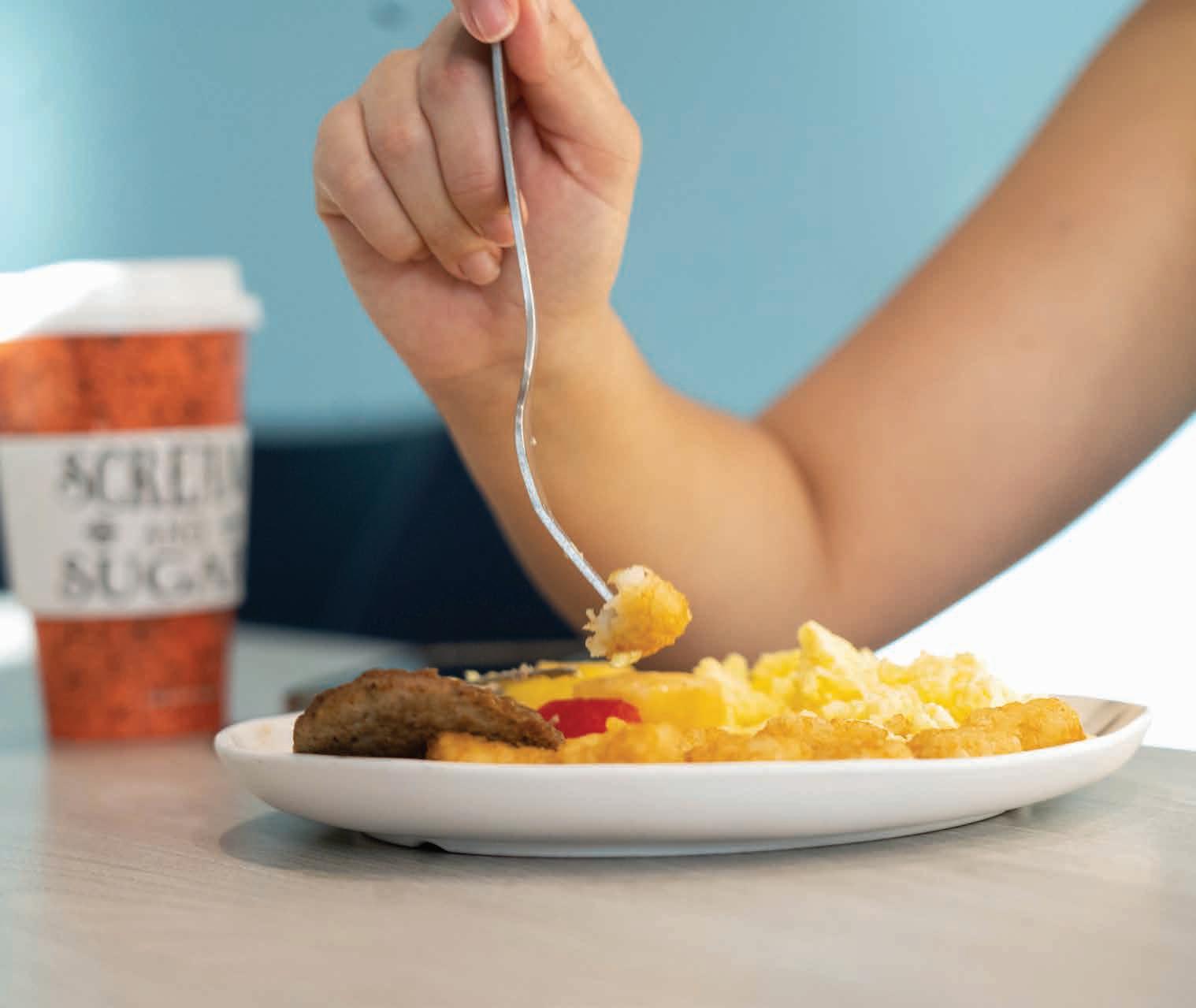
Breakfast at Broward Dining on Oct. 24, 2024.
her team is aware of concerns around calories in dining halls. She encouraged students to see calories as just one piece of information used to evaluate food — not the whole nutritional picture.
Watkins likes to keep healthy meal recommendations simple: Make sure to have a carb, a protein and a colorful fruit or vegetable with each meal, she said.
As a “dietitian who does not cook,” some of her favorite simple snack suggestions for college students include yogurt and granola, jerky, hummus with pita chips or smoothies.
At the end of the day, most foods fit into a healthy diet, and she encourages students to enjoy foods they love without guilt to support both physical and mental health, she said.
less stereotypically susceptible to eating disorders, trying to gain muscle to keep up with friends can turn gym culture toxic, she said. Going to extremes of eating a certain amount of calories and protein, taking supplements and even steroids are all ways students may try to get the results they want, at risk to their long-term health, she said.
For Matthew Bushee, an 18-yearold UF political science freshman, body image struggles or fear of the “freshman 15” haven’t impacted his experience on campus, he said. But as a regular gym goer, Bushee does notice the toxic effects of gym culture among his male peers, he said.

“A healthy relationship with food all starts with a healthy relationship with self,” she said.
As a former professional softball player, she also emphasized the importance of a balanced relationship with exercise. Particularly in men, a group
“It’s very, ‘I’m only doing this to look better for others,’” he said. “That really goes against why you should be doing it, which is just to feel better … Do it for yourself, and not because you want to achieve a certain image.”
@zoeythomas39 zthomas@alligator.org











However, he advised against looking to gambling to predict the race’s outcome. Certain markets have partisan leanings, he said, which skew betting activity.
A small segment of Americans engage with political prediction markets, meaning bettors do not represent the broader electorate. Like sports betting, election gambling is gaining traction among men under 30, with whom Trump has made substantial inroads.
Many election bettors use cryptocurrency-fueled Polymarket, the world’s largest platform for wagering on current events. Users can buy and sell shares until an event occurs. While the site prohibits Americans from entering election markets, bettors can skirt the rules using virtual private networks.
Polymarket has seen a recent surge in pro-Trump wagers, buffeted by billionaire tech mogul and Trump supporter Elon Musk, who tweeted Oct. 6 that prediction markets are “more accurate than polls.”
While most polls show a close race, some Polymarket users are betting heavily on a Trump victory, giving him a 64% lead over Vice President Kamala Harris’ 36%. A handful of wealthy bettors are responsible for the yawning gap.
Some, including Trump himself, have taken this in stride.
UF College Democrats president Connor Effrain said he’s observed
the phenomenon first-hand. He explained Gators — primarily young men — approach his organization’s table on campus to discuss the candidates’ Polymarket performance, boasting Trump’s odds.
“Since young men who are more likely to support Trump are also the ones more likely to be betting, they are probably going to bet in his favor,” Effrain said. “So using it as an indicator has glaring issues.”
Beyond sampling concerns, Effrain said prediction markets have become fodder for election memes, snuffing out political thoughtfulness among young voters.
Harris and Trump have leveraged social media to court young voters at the expense of more traditional campaigning.
“There's just so many [Instagram] reels or TikToks that just make jokes out of gambling on the election,” Effrain said. “[Bettors] don't really care who the winner is. They only care about how they can make money off of it.”
UF College Republicans did not respond to requests for comment before publication.
Before Oct. 2, political gambling was legal only on two platforms with strict betting thresholds. In the three weeks since the judiciary lifted a freeze on the financial exchange and prediction market Kalshi, tens of millions of dollars in bets have flooded the site. Rival platform PredictIt caps wagers at $850, while Kalshi caps them at $100 million.
Kristina Wright, 47, said she finds the judicial timing curious but doesn’t think the legalization of political betting will shake up the race. The UF political science graduate student warned that betting odds could affect voting intent, but bets themselves cannot supplant polling.
“It’s not a scientific method, and there's a lot of self-selection bias inherent in the betting process,” she said.
While prediction markets aren’t infallible, they have been reliable bellwethers in past races. Favorability odds on sites like Intrade have accurately tracked presidential outcomes since 1980, barring the 2016 race.
Santa Fe College adjunct political science professor Alex Patton has experience using political prediction markets and said he takes issue with their lax oversight.
“There's absolutely no regulation on this, and these markets are usually offshore,” Patton said. “I think that they're being manipulated, that I don't see a whole lot of safeguards built in.”
Patton said he’s concerned about potential election interference. Betting sites, he said, could meddle with social cues and social proof, in which people use others’ actions to decide their own. He explained that if one candidate pulls ahead of another on a betting site, voters may flip their position or stay home Nov. 5.
Online gambling, he added, has
wrought substantial harm on its target demographic. Patton predicts that political betting will have deleterious downstream effects.
“This is really egregious,” he said. “It’s gonna take us years to figure out the hell we've unleashed on young men.”
Scott Teitelbaum, vice chair of UF’s psychiatry department, isn't so sure. He said people who traditionally bet on sports are unlikely to wager on the presidency and even less likely to develop an addiction to political gambling.
David Price, a political science professor at Santa Fe College, echoed Teitelbaum, noting young
men aren’t generally interested enough in politics to put money on elections.
Price said he doesn’t think election betting will significantly impact the 2024 election. But in a race where candidates aren’t as polarizing or captivating as Harris and Trump, like the 1996 presidential race, election betting may spice things up, he said.
“A boring campaign like that, maybe, something like this would help mobilize people, but this is not that,” Price said.
@Nat_Kauf nkaufman@alligator.org

By Sara-James Ranta Alligator Staff Writer
In Florida, where there is no statewide curriculum for sex education, students face a patchwork of standards as districts set their own policies.
State guidelines mandate abstinence be presented as the expected social standard as part of required health education.
Because Florida schools aren’t required to provide sex education specifically, school districts are left to decide what type of sex education they provide to students, if any.
In Alachua County, advocates say these gaps leave youth unprepared. Parents are discussing topics at home and community groups are stepping in to fill the void, offering crucial lessons schools skip over.
Daneila Mcvea-Smith, education program director of the Southeast and North Florida Planned Parenthood chapter, said a lack of state-mandated standards creates disparities between counties over what is taught to students.
“It leaves a lot of questions about what can and cannot be taught,” she said. “It has various holes throughout the state in different districts, and us trying to figure out where to plug those holes in or what holes are missing.”
Community-based organizations like Planned Parenthood have begun to play that role in filling the gaps left by restrictive district policies by offering programs and resources directly to youth and students.
All Planned Parenthood programs available in Alachua County for students are for middle and high school-age youth, but are
primarily targeted for high school students, Mcvea-Smith said.
If a school chooses to teach HIV/AIDS instruction, state mandates require it to emphasize the benefits of heterosexual marriage. Mcvea-Smith said this disproportionately affects LGBTQ+ youth by failing to provide them with information about topics such as birth control, STI prevention, domestic violence and human trafficking.
Local policies limiting sexual education affect public health outcomes, such as STIs and teen pregnancies, Mcvea-Smith said.
“People want to assume that youth are not engaging in sexual activity,” she said. “If these laws continue to make it more difficult for organizations to be able to teach … it could lead to increases in pregnancies and STIs, simply because youth are unaware.”
From 2020-2022, there were 306 reported teenage pregnancies in Alachua County. The teenage pregnancy rate in Alachua County is about 5 percentage points lower than the statewide average.
Michelle Grimsley Shandano, director of public policy of the Southeast and North Florida Planned Parenthood chapter, said the key is empowering youth, parents and community partners to work together to provide sexual education.
“We are now having to lean on the community to provide support and education in areas that historically parents were able to trust in the school systems to provide,” she said.
Grimsley Shandano said she feels it’s important for the community to take responsibility and ownership in creating sex education stigmas. It’s more than knowing how to put a condom on or knowing how genitalia works, especially when school sex education curricu-
lums are not explicitly required to include instruction on consent, she said.
Florida became the first state in the nation to teach K-12 child trafficking prevention courses. In the programs Planned Parenthood teaches, Grimsley Shandano said the information is vital.
“We do have youth in our programs that didn’t know they were in an abusive or human trafficking situation,” she said. “A lot of youth don’t know how to determine those situations or that they’re even in those situations.”
The CDC released the School Health Profiles in 2019, measuring school health policies and practices to highlight which topics were taught in schools across the country. Florida has not participated in the profile since 2020.
Although data was collected from self-administered questionnaires, which may lead to internal bias, the CDC identified many sexual health education topics critical to ensuring youth sexual health and presented them in a country-wide profile.
Holly Shema, a 38-year-old seventh-grade science teacher at Lincoln Middle School, said her classroom covers genetics and reproduction strictly from a scientific perspective. Her pacing guides only allow her one week to teach sexual and asexual reproduction, she said.
Her curriculum no longer touches on human reproduction. Years ago, she spent two to three weeks on human reproduction, and could send out consent forms to parents, she said.
The topics she used to cover discussed the male and female reproductive systems and contraception. When she taught these subjects, Shema said she never used models or demonstrations, and parents reviewed the information she would use beforehand.
“I would do the egg baby project with them,” she said. “Cook all the little eggs, and then they have to take care of it and talk about the impacts of teenage pregnancy.”
Although sixth-grade science now covers body and reproductive systems, Shema said it’s not a main focus. Additionally, high school anatomy classes aren’t required for graduation, she said.
Shema said she faced challenges approaching a sensitive curriculum with students, especially when she did not split them up by gender in an effort to create a more inclusive space, she said.
“Once you’re in middle school, you’re like ‘Oh, I have a boyfriend, I have a girlfriend,’” she said. “It’s important that you know what the other sex has to go through.”
Last school year was the first year Shema decided to not teach human reproduction, citing she had too many parents “questioning and complaining,” she said.
Shema said she feels frustrated with how “rigid” teaching has become, which limits her ability to teach sex education. She also said she’s afraid of getting in trouble due to many statewide policies restricting what she can teach, such as House Bill 1557 (2022), or the “Don’t say gay” law.
“We need to be following and doing exactly what the county says and when the county says we should be there,” she said. “Adding in additional programs to help teach kids about being a better, more well-rounded person are getting pushed to the side.”
Read the rest online at alligator.org. @sarajamesranta sranta@alligator.org
By Vera Lucia Pappaterra Allgator Staff Writer
When Florida ranked as the leading state in student-athlete safety, the Florida High School Athletics Association saw it not as an achievement but as a rubric for improvement.
The state was 14 points away from a perfect score under Korey Stringer Institute, which is an organization dedicated to preventing sudden deaths in sports.
Florida’s focus on student-athlete safety made a significant shift in 2017 when Laurie Giordano’s 16-year-old son, Zachary Martin, collapsed from an exertional heat stroke after a fourhour football practice in the summer heat. His internal body temperature reached 107 degrees, and after a week, he died from a coma.
Giordano founded the Zach Martin Memorial Foundation to educate athletes, parents and coaches on
preventing exertional heat illness, or EHI. Her advocacy led to a 2018 mandate by the FHSAA requiring high school athletic programs to complete EHI education and safety training.
KSI evaluated the safety policies of secondary school athletic programs across the country. This report, published in The Orthopedic Journal of Sports Medicine, assessed policies for the top causes of sudden death in student-athletes, such as exertional heat stroke, cardiac events and traumatic head injuries.
In response to the KSI findings, UF’s Patricia “Pattie” Tripp, a clinical professor and associate director of the Doctor of Athletic Training program, assembled a task force to address gaps in healthcare services for student-athletes in Florida.
Tripp, who previously served as president of the Athletic Trainers’ Association of Florida, worked closely with the FHSAA and the task force to assess what was missing in Florida’s schools and how best to address the gaps in safety practices.
“We looked at the task force as
an opportunity to add more information,” said Tripp, “and to get athletic trainers in all of those different places.”
Athletic trainers specialize in the management and care of athletes and, when present, are often the first medical professionals on the scene of injuries.
The task force conducted an indepth review of all 67 counties in Florida, evaluating access to athletic training services and other critical healthcare resources.
The task force found 22 counties had little to no access to certified athletic trainers or healthcare providers for student-athletes, leaving many schools vulnerable to preventable incidents like Zachary Martin’s.
The task force used a “red, yellow, green” assessment to identify the counties with minimal or no access to certified athletic trainers. Tripp said the group marked 22 counties “red.”
Tripp’s task force developed recommendations that directly influenced FHSAA policy changes, including new safety protocols for
heat illness management, concussion treatment and access to on-site athletic trainers during high school sports events. As of July 1, these policies were implemented across Florida.
At UF, Tripp continues her efforts by educating future athletic trainers through the Doctor of Athletic Training program, ensuring they are equipped to handle the complex challenges of sports safety.
At UF Health, Athletic Training doctoral candidates provide sports safety implementation to Gainesville area schools.
Mikayla Franklin, a 26-year-old second-year doctoral candidate in the program, works as an athletic trainer at Eastside High School. She is responsible for injury evaluations, acute care during emergencies and managing heat safety protocols across all sports.
“We take their wet bulb temperature every day, and based on the guidelines, we can alter practice,” Franklin said. “If it’s too hot, we may have to push practice back or cancel it completely.”
The integration of athletic trainers into local high schools ensures that student-athletes receive immediate medical attention when needed, reducing the risk of severe injuries and illnesses, Franklin said.
The program also addresses healthcare disparities in rural areas, where access to medical services may be limited. Franklin said many students may not have a primary care physician, making their access to qualified healthcare professionals even more critical.
“We’re able to refer them to some of the best orthopedists in the area, which I think is really important for them,” she said.
By training professionals like Franklin to work directly within schools, the Doctor of Athletic Training program not only enhances the safety and well-being of studentathletes but also contributes to a culture of awareness and preparedness, Tripp said, which can save lives.
@veralupap vpappaterra@alligator.org
By Delia Rose Sauer Alligator Staff Writer
Within two weeks last month, Graduate Assistants United reached an agreement with UF to expand health insurance benefits for graduate, teaching and research assistants.
GAU, the labor union representing UF graduate assistants, ratified changes to Article 12, which focuses on the pricing of GatorGradCare and its included healthcare benefits for graduate assistants.
The union bargained for expanded coverage under Tier Three of GatorGradCare — which previously only covered emergency room visits — lower premiums for GAs with dependents and dental and vision plans to make healthcare more affordable and accessible for GAs.
Making official changes to GatorGradCare took eight months.
After reviewing the UF bargaining team’s counter-proposal, the union confirmed the new benefits on Sept. 18. All changes to GatorGradCare will be implemented Jan. 1.
The union made its first proposal with changes to Article 12 in December 2023. The UF bargaining team returned with its counterproposal Aug. 15, with the caveat that both parties would have to agree to any changes within two weeks to ensure changes could apply in time for the new year.
UF declined to comment on why it took eight months for the bargaining team to create a counterproposal.
GAU proposed changes to premiums, coinsurance adjustments, expanded Tier Three coverage and lower emergency care deductibles. The UF bargaining team agreed to most of GAU’s original changes. Its counter-proposal included not changing the current coinsurance rate and offering an add-on dental plan.
After GAU issued another counter-proposal — which included reopening bargaining for the dental plan and more clarifying
language — both teams agreed to the established changes. Going forward, Article 12 will be bargained every year to ensure it reflects the needs of graduate assistants, according to GAU leadership.
Ethan Savitch, a 26-year-old UF astronomy graduate assistant, is a steward for the union, acting as a GAU representative for the astronomy department. He’s been enrolled in GatorGradCare since his first year as a GA.
He decided to use GatorGradCare because he felt the plan was reasonably priced for its benefits. Savitch has chronic back pain, and through the graduate insurance, he was able to set up recurring appointments with a physical therapist through UF Health.
“I have benefited from where it’s at right now,” Savitch said. “Some of the things like dental are a little harder to get.”
He found the dental add-on plan the most appealing. He knows many graduate assistants who either make their appointments back home or months in advance. Having a better plan would help create greater access to those services that some GAs may need sooner rather than later, he said.
Savitch hopes the changes to healthcare plans incentivize GAs to enroll in GatorGradCare and use the benefits GAU bargained for, especially because the union is working to stay active on campus.
“GatorGradCare is very essential for the graduate students,” he said. “The stuff that the union does to improve it is critical for all graduate students.”
GAU Chief Bargainer Austin Britton, a 26-year-old UF geography graduate student, sees the changes as a step forward for improving GA healthcare. However, the process was frustrating and not without its challenges, he said.
“We had to really drop everything to focus on healthcare, on their counter-proposal, on parts we could agree with and what we couldn’t agree with,” Britton said.
According to Britton, GAU is not completely satisfied with the agreement it reached for Article 12. Because of the twoweek deadline, there were changes GAU compromised on, such as the price of the dental plan, to get the article ratified in
time.
The union’s bargaining team already has more changes to propose when healthcare bargaining reopens next year, and its main goal is to decrease premium pricing for the dental plan, Britton added.
“We will keep bargaining until it’s done,” Britton said.
There are three tiers of coverage under the GatorGradCare insurance plan. Tier One includes all UF Health and Shands Hospital providers. Tier Two is an extended network including doctors, clinics and hospitals from the Florida Blue Network. Tier Three includes out-of-network providers and emergency room visits.
There is also an out-of-area insurance plan that includes two tiers. Tier One is the equivalent of a Tier Two plan from the inarea coverage.
The biggest changes apply to GatorGradCare’s out-of-network Tier Three, where coverage is now available for GAs. The individual deductible for GAs based in Gainesville and Jacksonville will now be $1,000 with an out-of-pocket maximum of $6,000. Family deductibles are now $2,000 with an out-of-pocket maximum of $12,000.
For the out-of-area Tier Three plan, individual deductibles cost $400 with an out-ofpocket maximum of $4,000. Family deductibles now cost $800 with an out-of-pocket maximum of $8,000.
Across all tiers, the emergency care deductible was reduced by $100. Tier One emergency care is now $150 and $250 for Tiers Two and Three.
The new changes also offer vision and dental as add-on insurance plans. While not built into GatorGradCare, the new plans will include additional payments separate from the usual tiers graduate assistants get pulled from their paychecks. Enrollment into either of the plans needs to be completed by Nov. 1.
The employee-only dental plan will cost $20 a paycheck with an out-of-pocket maximum of $1,500 a year. The employee-only vision plan costs $5.81 a month.
However, employee-only coverage premiums increased by $5 per month, now totaling $17.65 to balance Tier Three costs and to reduce premiums for dependents.
Premiums for employees and spouses
decreased by $48, now costing $162.85 a month. Employee and children premiums decreased to $146.25 a month. Employee and family — defined as spouse and children — decreased from $400 to $224.53 a month.
Premium costs are now locked until bargaining reopens for Article 12. As Article 10, which involves GA stipends, continues to be bargained, healthcare plan pricing and premiums are fixed. They will not change with any increase in yearly stipends.
The last major change is that GatorGradCare is now an opt-out plan. GAs will automatically be enrolled in an employee-only plan unless they decide to opt-out. GAs will still need to complete the Student Health Care Center waiver so they do not get charged $1,000 for the UF student health insurance.
Nathan Arndt, a 34-year-old fifth-year material science and engineering doctoral candidate, also said the new changes to Article 12 are a step forward in getting better benefits for GAs. As the healthcare committee chairman for GAU, his role is to work for better access to healthcare alongside the bargaining team.
He helped set up health screenings with GatorGradCare, where GAs can get physical exams to earn different gift cards, and said he was glad to see the additional coverage for glasses and eye appointments and the lower premium costs for GAs with families.
The biggest win was the dental plan add-on, even though he hopes to lower the price per month, Arndt said. When faced with a dental emergency, Arndt had to use a third-party dental plan because there was no dental plan to rely on as a GA. Now, other graduate assistants don’t have to worry about paying per visit if they visit the UF dental school for a cleaning.
Arndt said the new changes will give GAs less to worry about, especially for international students who may not have experience navigating the United States’ insurance system.
“It will just be a lot easier for the majority of people,” he said.
@_delia_rose_ drosesauer@alligator.org
MONDAY, OCTOBER 28, 2024
www.alligator.org/section/the_avenue
THE ALZHEIMER’S ASSOCIATION
HOSTED ITS ANNUAL WALK OCT. 26 TO FUNDRAISE FOR RESEARCH AND RESOURCES
By Juliana DeFilippo Avenue Staff Writer
Walk to End Alzheimer’s participants created a field of color as they held up orange, yellow, blue and purple flowers. Looking around at one another, they noticed dozens of people scattered around the field holding the same color flower.
The Alzheimer’s Association hosted its annual Walk to End Alzheimer’s Oct. 26, with 756 participants walking together to show their support. The Gainesville event aimed to raise money to fund research and provide resources to those affected by the disease.
The association’s Promise Garden served as the starting point of the walk, where participants gathered at Trinity United Methodist Church before setting off on their one-mile route. The Alzheimer’s Association also asked participants to make donations or set a fundraising goal when they registered individually or with a team.
According to the Alzheimer’s Association, about 11.6% of people over the age of 65 in Alachua County are living with Alzheimer’s.
Vinell Griggs, a 76-year-old who cares for her husband with Alzheimer’s, has participated in the walk since 2018. Contributing $5,415 to the Alzheimer’s Association, she was announced the walk’s top individual fundraiser, a title she has held for three years.
Griggs described fundraising as “fairly easy” because of her connections to the community. She reached out to her friends and husband’s business contacts to raise money for the event.
During the walk, the Alzheimer’s Association invited participants to carry flowers with colors representative of their relationship to the cause.
Participants carried orange flowers to show their support for the fight against Alzheimer’s, yellow flowers to indicate they were caretakers to someone with the disease, purple flowers to represent losing a loved one to Alzheimer’s and blue flowers to show they were living with the neurological disorder.
Griggs walked with a yellow flower to symbolize the support she provides for her husband diagnosed with Alzheimer’s. Being a caregiver and dealing with the tasks that come with it is not easy, she said.
“A couple of previous years, he [Griggs’ husband] and I were on the stage, but he’s not able to do that anymore, so I set up a garden every year of the flowers that I’ve accumulated,” she said.
Skyler Davis, the development manager for the Walk to End Alzheimer’s in Gainesville and Tallahassee, said the promise garden ceremony is a way to find solidarity in the fight for a cure, especially for caregivers, who often struggle to find support.
“Seeing all the people raise their yellow flower in the promise garden ceremony at the same time can be really healing and empowering for those people,” Davis said.
Davis said she became involved with the Alzheimer’s Association because there was a lack of resources for caregivers and people liv-
ing with Alzheimer’s. While working in healthcare, she noticed many caregivers struggled to take needed time to “step away for a second.”
Because Alzheimer’s home care is often not covered by insurance, Davis explained, relatives of those affected by cognitive disabilities often take on the role of a caregiver. Davis felt she had nowhere to direct these people until she found the Alzheimer’s Association.
“They provided all of the things that I wish I had been able to tell people when they called looking for help,” she said.
Davis said caregiving for someone with a memory disorder can be “lonely,” as the patients often cannot express gratitude for the assistance they are getting. Being a caregiver can also involve difficult decisions when it comes to the best way to support someone living with Alzheimer’s.
Many groups that offer support for families and in-house care for Alzheimer’s and dementia patients tabled at the event and gave out information to walk participants.
Sonja Weimar, a 46-year-old social worker, attended the event as a representative of HCA Florida Senior Healthcare Centers. Weimer said the work caregivers do involves striking a difficult balance between autonomy and patient safety.
Weimar often helps families make challenging decisions about caring for a family member with a cognitive disorder.
“Everybody mostly wants to live independently as long as they can until the very end,” she said. “People want to live in their own homes. And unfortunately, with Alzheimer’s, that can become less and less safe.”
While caregiving is challenging, resources provided by organizations like the Alzheimer’s
Association can help families find support in the face of difficult decisions. The association also raises money to fund research, like that of Eiko Alzamora, a 22-year-old UF biomedical engineering doctoral student.
“We are hoping to bring all this research to clinical trials and actually go into the market,” Alzamora said. “Currently there’s only two medications for Alzheimer’s, and most of them are antidepressants, and it’s not really treating all the symptoms. So we want to try to stop the regression.”
As 61-year-old event chair John Tull explained, the association provides medical specialists, advocacy and support groups that can assist families and people living with Alzheimer’s.
Tull has been involved with the nonprofit for 15 years and walks for his mother-in-law Rose, who passed away from Alzheimer’s in 2017. While the walk raises money for the Alzheimer’s Association’s research, Tull views it as a way of connecting with others over a shared experience.
The association’s ultimate goal is to end the disease, according to the organization’s website. In addition to the orange, yellow, purple and blue flowers, the Promise Garden has a single white flower, representing the first person to survive Alzheimer’s.
“There’s no cure,” Tull said. “They’re working on it. But this walk is for all the caregivers and all the community supporters who need to know that they’re not alone and there are people that can help support them.”
@JulianaDeF58101 jdefillipo@alligator.org
SIX CAFES WITH FALL MENU ITEMS AND SPECIALS
By the Avenue Staff
Keke’s Breakfast Cafe
Juliana DeFilippo
With its homespun decor and diner-esque layout, Keke’s Breakfast Cafe offers retro charm and a variety of fall menu items. The cafe’s Fall Flavors menu includes pumpkin spice and apple cinnamon, allowing guests to enjoy new variations of classic menu items like stuffed french toast.
Keke’s apple cinnamon waffle, which comes with powdered sugar, cinnamon and apple slices on top, is rich with sweet, tangy flavor. Guests looking for a warm, earthier dish can opt for the pumpkin spice

stuffed french toast, which is made up of pumpkin puree, cream cheese and pecans sandwiched between two slices of french toast.
Keke’s also offers an autumn sangria, a merlot with spiced brown sugar, citrus and a cinnamon stick.
Prices for pancakes and waffles from the Fall Flavors menu range from $11 to $13, while stuffed french toast is priced at $14. Guests also have the option of creating combos to get a wide variety of menu items and flavors.
Keke’s Breakfast Cafe, located at 4062 Plaza Blvd. #10, is open Monday to Sunday, from 7 a.m. to 2:30 p.m.
Coffee Culture
Rachel Mish
Coffee Culture, an eclectic cafe adorned with vintage decor, offers a fall menu with October specials. Throughout October, its specials
Keep up with the Avenue on Twitter.
Tweet us
@TheFloridaAve.
Caimán
include three lattes: the Twisted Pumpkin, Zombie and Vampire’s Kiss.
Vampire’s Kiss is a personal favorite of Mic Kenney, Coffee Culture’s 21-year-old manager. The latte includes vanilla and raspberry flavors.
“I’m a sweeter coffee person,” Kenney said.
The Twisted Pumpkin latte includes pumpkin and caramel flavors. The drink is a stark contrast to Zombie, which uses cinnamon and macadamia nuts.
The store has new specials every month, which Kenney said many people order in an attempt to switch things up.
“About 40% of the drinks that we make are Twisted Pumpkin right now,” she said.
The cafe’s pastry offerings include pumpkin chocolate chip bread, lemon cake and muffins of various fla-
vors. The cafe is open seven days a week, from 6 a.m. to 7 p.m., and is located at 2020 NW 13th St.
Opus Coffee
Tanya Fedak
Opus Coffee does not disappoint avid fall drink consumers with its creation of fall flavors, introducing a menu with four fall-themed drinks.
It’s not fall without a pumpkin spice latte, but the Gainesville coffee chain takes it a step further, naming the popular drink “It’s The Great Pumpkin (Spice Latte).” Made with pumpkin spice syrup and caramel sauce, the latte adds an additional fall flare with toasted marshmallow, whipped cream and pumpkin pie spice toppings.
Coffee lovers can also order the “Opus Pocus,” a shaken espresso with pumpkin spice, maple syrups, crème caramel cold foam and
Venezolanos y sus crecimientos y conexiones en la ciudad. Read more on pg. 8.
cinnamon sugar on top. For those less interested in caffeine, there is a chai latte with caramel apple butter named “Starry Hollow,” which pays homage to the popular fall comfort show “Gilmore Girls.”
The final fall item is the “Practically Magic” double cortado with spiced brown sugar, complete with a dash of orange bitters and garnished with cinnamon.
With over 10 locations, Gainesville residents have plenty of opportunities to test out the Opus fall spirit and can order ahead on its website.
Opus Coffee’s UF Norman Hall location — 1221 SW 5th Ave. — is open Monday to Friday, from 7:30 a.m. to 4 p.m.
Read the rest online at alligator.org/section/the_avenue.
This is an Avenue staff report.

www.alligator.org/section/opinions
There is a forgotten voter in this election, and it’s the most important for the future of the country and each party: white, Christian young men. While many predicted Gen Z to be one of the most liberal generations in the country’s history, they were only half right. Gen Z women voters have followed this prediction, but the men have started a change in the culture.
So why are so many young white men attracted to the conservative ideology? It’s because they have been lied to over and over again. Young men were told growing up to suppress their masculinity in a world that hates men. They were promised a future like their fathers and grandfathers had. But that future does not exist anymore.
The Democratic Party has proven it hates masculinity and Christians. Look at the Harris and Walz campaigns: A young white man yelled out religious phrases like “Christ is king” in response to a pro-abortion section in Harris’ speech, and she responded with, “You’re at the wrong rally.” It’s the same party that passed a New York law requiring government employee health insurance to pay for abortions, causing pain to those who didn’t want their taxes to pay for something they had a moral obligation to oppose.
The system around white men has been designed through liberal policy to discriminate against them. Look at the college admission process or hiring: If you are a straight white man, you know you are at a disadvantage when it comes time to any application. The same people that keep these systems running and discriminating against white men, are the same ones that will vote liberal time in and time out. DEI policies have proved to discriminate against white men. By trying to reach equity over equality,
the system has been made to put qualified white men at a disadvantage.
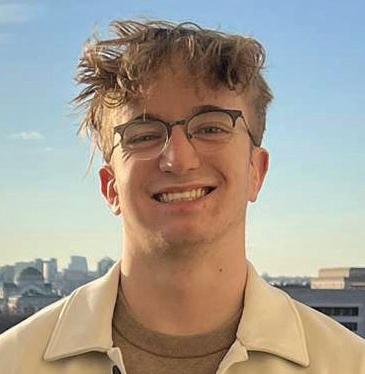
With the election approaching and tensions rising among Democrats and Republicans, Gen Z is lining up at the polls and mailing in their ballots. Our generation has the opportunity to make real change here, so as a small reminder, please go out and vote!
Lucas Sprung opinions@alligator.org
This election, 49% of Christians are not expected to vote. While the Democrats have fully rejected Christians, the Republicans have worked to gain the Christian vote. Trump has promised protection of Christians in Armenia and to end the anti-Catholic bias in America. In my opinion, the person who supports Christians the most is the best candidate and the best human. Christians are the true backbone of America. The biggest charities in America are Christian-based. Instead of pandering to different groups, the best strategy for any candidate to win this election is to support the Catholic church. Maybe the simplest way to describe why young white, Christian men are becoming conservatives is their own survival. The spirit of men is a fighting spirit. They want to have a bigger purpose in life. They want to have control over their own future. This is why more young men are going to the Catholic church, because over the last 2,000 years, many have tried to defeat the church, but it has always won and still stands. Men want to have this spirit, they see how society has come to suppress them and see conservatism as a way to beat this.
Read the rest online at alligator.org/ section/opinions.
Lucas Sprung is a UF political science and international relations junior.
That being said, I’ve noticed an uptick in my fellow young male voters’ allegiance to conservatism. Oddly enough my sister’s exboyfriend was one of them, who took time from what I assume was a very busy day to ask me who I was voting for. But before I could answer, I was met with a slew of remarks speaking on the future of our country under Harris’ presidency and how Trump would make this country great again through his many unidentifiable policies. Even at work, a co-worker asked me the same question and I was met with more remarks, telling me about my catastrophic mistake in not voting for Trump and the many ways in which Harris is a dangerous person. It was the crème de la crème of political idolization, and I stood as its reluctant martyr.
While I’ve long since recovered from the realization of my involvement in our country’s ensuing downfall, I realize that if we look at the current situation of men in our country and the rise of young male conservatism, we begin to see a pattern. With male loneliness and violence on the rise, and women making up a larger portion of the population attending college, why are we seeing not only the rise of conservatism among young men but a simultaneous redirection of men’s issues towards women?
It’s that this is the manifestation of men’s breaking point, brought on by a tremendously long history of the patriarchy’s impact on men and the standards they are expected to adhere to. Men aren’t allowed to be emotionally vulnerable. They’re expected to bring
The views expressed here are not necessarily those of The Alligator.


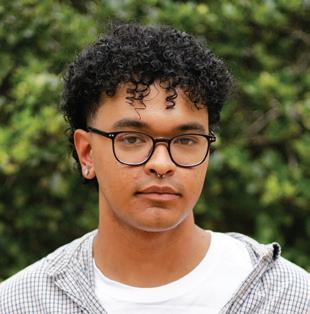
opinions@alligator.org
home the bacon, steer clear of anything remotely feminine and the list goes on and on. We can see how this has led to men suffering from depression or anxiety, most of which is underdiagnosed, leading to higher suicide rates in men. It’s an important issue that is characterized by patriarchal standards that men continue to perpetuate. We see it in the rise of young men looking towards Andrew Tate and other male-focused influencers who take advantage of these vulnerabilities.
Men are feeling lonely, ridiculed and blamed for larger social issues. Conservatism offers a chance to find a community that instills them with a false sense of belonging and confidence. It’s comparable to incel groups who are notorious for their views on women and their beliefs on involuntary celibacy, or rather, blaming women for their sexual shortcomings. Men, who are at their lowest, find community in each other and come together to fight a common enemy — women. Feminism in its fight for gender equality has allowed women to decenter men and it’s left men more insecure and hopeless than ever before. Conservatism on the rise amongst young men allows us to see conservatism for what it truly is: a way to reject women as they too have already been rejected, adhering to ideals that are characterized by traditionalism and misogyny to stroke their egos and reinstate their positions of superiority.
Read the rest online at alligator.org/ section/opinions.
Eriel Pichardo is a UF English senior.
encourages comments from readers. Letters to the editor should not exceed 600 words (about one letter-sized page). They must be typed, double-spaced and must include the author’s name, classification and phone number. Names will be withheld if the writer shows just cause. We reserve the right to edit for length, grammar, style and libel. Send letters to opinions@alligator.org, bring them to 2700 SW 13th St., or send
14257, Gainesville, FL 32604-2257.Columns of about 450 words about original topics and editorial cartoons are also welcome. Questions? Call 352-376-4458.







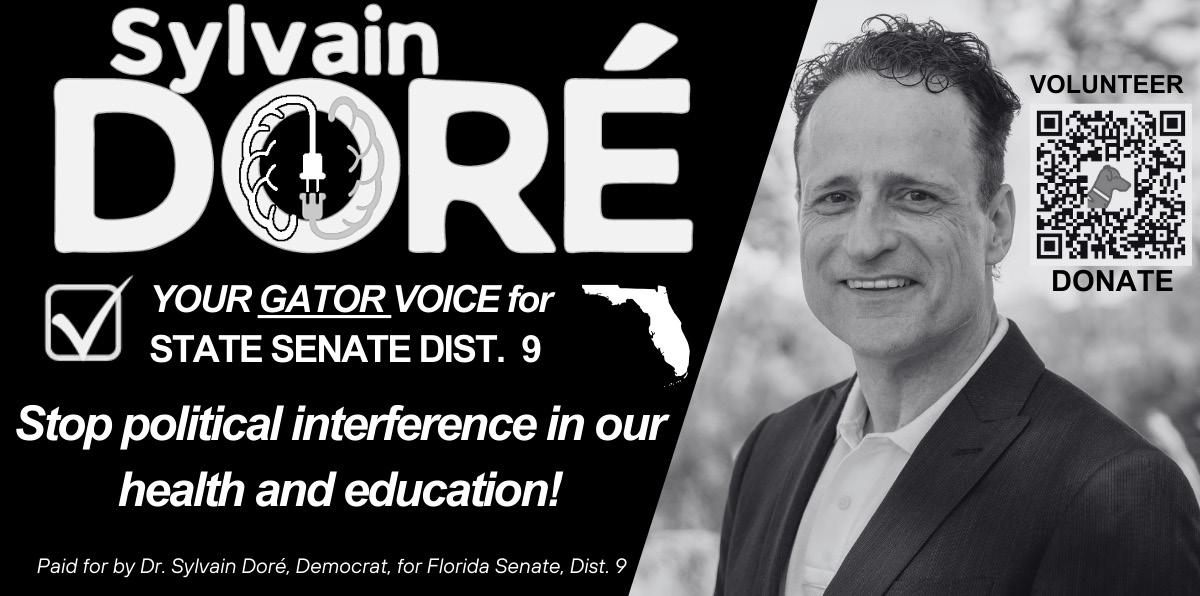

LUNES, 28 DE OCTUBRE DE 2024
www.alligator.org/section/elcaiman
LA COMIDA FOMENTA LAS CONEXIONES CULTURALES Y EL IMPULSO EMPRESARIAL, DICEN PROPIETARIOS Y CLIENTES
Por Isabela Reinoso Escritora de El Caimán
La tendencia de convertir los camiones de comida en restaurantes tradicionales ha hecho brotar una colorida variedad de comidas por todo Gainesville, una gran parte de los cuales procede de raíces venezolanas.
Algunos restaurantes han crecido junto a la comunidad hispana, que representa alrededor del 12% de los residentes de Gainesville. Otros acaban de seguir sus pasos abriendo sus negocios.
Más allá de satisfacer los antojos de la comunidad, los dueños de restaurantes venezolanos se han encontrado creando conexiones significativas con sus clientes, lo que a su vez alimenta su espíritu emprendedor.
Así nació hace seis años Arepa Burger, un camión de comida venezolana que en agosto abrió su local permanente en Depot Village. Su propietario, Víctor Hugo Suárez, un antiguo veterinario de 63 años, decidió cambiar de rumbo e invertir en gastronomía tras encontrar dificultades para conseguir un empleo en su campo tras su traslado de
Maracaibo a Gainesville.
Desde el primer día que encendió el motor de su camión de comida hasta ahora, ha recibido comentarios positivos de la ciudad. Él cree que se debe a que su pasión y amor por servir y cocinar su comida se traslada a su negocio.
“No hacemos algo por hacerlo” dijo Suarez. “Le ponemos mucho ánimo y mucho corazón a lo que se está preparando”.
Con una ubicación fija, dijo que planea mejorar el menú y potenciar su nuevo local para crear un entorno más acogedor que aumente su clientela, con el objetivo a largo plazo de abrir más restaurantes por la ciudad.
Arepa Burger es uno de los muchos restaurantes venezolanos de Gainesville. La Maracucha, especializada en la misma cocina, comenzó su trayectoria por un camino similar.
Eros Puentes, el dueño de La Maracucha, de 37 años, inició su negocio acompañado de la incertidumbre que trajo COVID-19 en marzo de 2020.
Sin embargo, la pandemia no fue un obstáculo para Puentes, ya que el año pasado tuvo la oportunidad de abrir una tienda física en 1023 W. University Ave.
Sorprendido por lo receptivos que eran los residentes y estudiantes de Gainesville a la comida, amplió su menú. Otra oportunidad se le abrió en mayo de 2023, cuando amplió el espacio de su restaurante.
“La recepción de los clientes con nosotros
es algo que yo no he visto en ningún otro negocio que yo haya tenido antes.” dijo Puentes.
Aunque no disponía de medios económicos para ampliar su negocio, dice que no lo dudó.
“A nosotros se nos presentó la oportunidad y no teníamos el dinero, igual la agarramos”, él dijo. “Ya después se resolverá”.
Ahora tiene su propio espacio, y su próximo objetivo es perfeccionar las operaciones y servicios del restaurante, ya que cree que beneficiará a sus empleados y clientes.
Confiado en la calidad de su comida, dice que no le preocupa la competencia de otros restaurantes venezolanos de la ciudad. Más bien cree que los restaurantes que ofrecen productos y servicios similares le ayudan a ser más creativo y le empujan a ofrecer un mejor servicio.
“Si la competencia se va capaz y nosotros decaemos también”, dijo Puentes. Andreina Cabello, venezolana de 64 años y propietaria del camión de comida Bowls Delicious Food, se trasladó a Gainesville hace tres años con un objetivo claro. Quiere compartir los sabores de su país.
Después de mudarse a Gainesville, se dio cuenta de que echaba de menos la comida de su tierra natal y dijo que quería fusionar su herencia colombiana y venezolana con un toque americano para que más gente se sintiera incluida. Encontró la manera de servir su comida en lo que cree que se ha convertido
en algo popular e innovador: en forma de bowls.
Cabello empezó sirviendo su comida en un estacionamiento antes de trasladarse a una localización permanente en la University Avenue.
Cabello se alegra de la reacción de la ciudad ante su negocio. Cree que la originalidad de sus platos tiene mucho que ver con su éxito. Desde que ha cambiado de localización, la demanda se ha disparado.
“Me tocaba botar comida en los dos lugares que me puse anteriormente, y ahora no llevo comida a la casa”, dijo ella.
Ofrece descuentos a los estudiantes y da prioridad a los días de los partidos de fútbol americano, ya que considera que son los días de más éxito para el camión de comida. Su objetivo a largo plazo es tener varios camiones de comida por toda la ciudad.
El cofundador de Bowls Delicious Food y marido de Cabello, Charles Morris, no habla español, pero dijo que le sorprende que la mayoría del apoyo provenga de latinos.
"La gente de Colombia... simplemente viene aquí porque es de Colombia", dijo Morris.
Lea el resto en línea en alligator.org/section/elcaiman. @isareinosod ireinoso@alligator.org
FOOD FOSTERS
CULTURAL CONNECTIONS AND ENTREPRENEURIAL DRIVE, OWNERS AND CUSTOMERS SAY
By Isabela Reinoso Alligator Staff Writer
A trend of food trucks converting to brick-and-mortar restaurants has sprouted a colorful palette of delicacies across Gainesville, a large chunk coming from Venezuelan roots.
Some restaurants have grown alongside the Hispanic community, which makes up about 12% of Gainesville residents. Others are just now following in their footsteps by opening their businesses.
Beyond fulfilling the community’s cravings, Venezuelan restaurant owners have found themselves creating meaningful connections with their customers, which in return fuels their entrepreneurial spirit.
That’s how Arepa Burger, a Venezuelan food truck, came to

life six years ago, and in August, its permanent location opened at Depot Village.
Owner Victor Hugo Suarez, a 63-year-old former veterinarian, decided to change course and invest in gastronomy after finding it difficult to secure a job in his field following his move from Maracaibo, Venezuela, to Gainesville.
From the day he first cranked his food truck's engine until now, he said he’s had positive feedback from the city. He believes it’s because his passion and love for serving and cooking his food bleed into his business.
“We don't do something for the sake of doing it,” Suarez said. “We put a lot of spirit and a lot of heart into what we prepare."
With a fixed location, he said he plans on improving the menu and enhancing his new place to create a more customer-friendly environment to increase his clientele, with the long-term goal of opening more restaurants around the city.
Arepa Burger is one of the many Venezuelan restaurants in Gainesville. La Maracucha, which
Mantente al día con El Caimán en Twitter. Envíanos un tweet @ElCaimanGNV.
specializes in the same cuisine, began its journey through a similar path.
Eros Puentes, the 37-year-old owner of La Maracucha, started his business accompanied by the uncertainty COVID-19 brought in March 2020.
However, the pandemic was not an obstacle for Puentes, as last year he had the opportunity to open a brick-and-mortar store located at 1023 W. University Ave.
Surprised by how receptive Gainesville residents and students were to the food, he expanded his menu. Another opportunity opened for him in May 2023 when he expanded his restaurant’s space.
“The welcoming of customers to us is something I have not seen in any other business I have owned before,” Puentes said.
Although he did not have the financial means to expand his business, he said he did not hesitate.
“We were presented with the opportunity, and we didn't have the money, but we still took it,” he said.
“The problem will be solved later.”
Now he has his own space, and his next goal is to perfect
the operations and services of the restaurant, as he believes it will benefit his employees and customers.
Confident in the quality of his food, Puentes said he is not concerned about competition from other Venezuelan restaurants in the city. Rather, he believes restaurants providing similar goods and services help him to be more creative and push him to provide better service.
“If the competition goes away, maybe we go down, too,” he said.
Andreina Cabello, a 64-year-old from Maracaibo, Venezuela, and the owner of the food truck Bowls Delicious Food moved to Gainesville three years ago with a clear goal in mind: to share the flavors of her country.
After moving to Gainesville, she found herself missing the food from her homeland. She said she wanted to fuse both her Colombian and Venezuelan heritage but add an American twist so more people could feel included. She found a way to serve her food in what she believes has become popular and innovative: in the form of bowls.
Cabello first started serving
her food in a parking lot before moving to a permanent location on University Avenue.
Cabello said she is joyful with the city’s reaction to her business. She believes the originality of her dishes plays a big part in her success. Ever since she’s moved locations, the demand has skyrocketed.
“I used to throw food away in the two places I was before, and now I don't bring food home,” she said. She gives a student discount and prioritizes working on game days, as she said she considers those to be the most successful days for the food truck. Her long-term goal is to own multiple food trucks across the city.
Co-founder of Bowls Delicious Food and Cabello’s husband, Charles Morris, does not speak Spanish, but he said he is amazed by how the majority of the support comes from Latinos.
Read the rest online at alligator.org. @isareinosod ireinoso@alligator.org
Síganos para actualizaciones Para obtener actualizaciones de El Caimán, síganos en línea en www.alligator.org/section/elcaiman.
● Affordable RV Camping Near Campus! ● Convenient location just minutes from UF. Safe, quiet, perfect for game day weekends. Water, electric, and Wi-Fi. Reserve your spot today! 352-372-1026 katesfishcamp.com Book Early – Limited Spots! 12-2-24-8-15
From $1179. 352-377-1633 10-28-5-2
REAL ESTATE AUCTION – Nov. 7 at 11 AM.
Discover an extraordinary opportunity to own a piece of West Virginia’s stunning natural landscape. 3,377± Acres located in Greenbrier and Monroe Counties are being offered in 21 tracts, ranging in size from 5 to 1,000 Acres. Several tracts are only minutes to the Greenbrier Resort. Online bidding is available. Visit woltz. com for details or call Woltz & Associates, Inc., Real Estate Brokers & Auctioneers. 800-5513588. Jim Woltz, Broker (WVAL #1000). 5% Buyer’s Premium. 10-28-2-5
Part-Time Assistant Property ManagerGreat opportunity for an eager and driven UF student who likes real estate and wants to learn about property management. Georgetown Apartments in Gainesville needs your help to work on Saturdays and Sundays (1 hr on Fridays initially for training). $16hr Part-Time. If interested, contact Mr. Oz Gratacos, Manager, at ogratacos@ deval.us or (703) 350-9447. 10-28-24-4-14
● ● MUSICIAN NEEDED ● ● at Lake City Fla's Bethel Methodist (GMC) to play traditional hymns in Sun-Worship. To inquire, please call Pastor Louis 352-658-0847 11-2-5-14
●ADMINISTRATIVE ASSISTANT ● Part Time, Flexible Hours. $25 / hr. Duties include filing & organization of documents. Call 865-363-5464 10-28-24-1-14
You need a local expert provider that proudly stands behind their work. Fast, free estimate. Financing available. Call 1-888-967-1158. Have zip code of property ready when calling! 10-28-43-15
Don't Pay For Covered Home Repairs Again! Our home warranty covers ALL MAJOR SYSTEMS AND APPLIANCES. We stand by our service and if we can't fix it, we'll replace it! Pick the plan that fits your budget! Call: 1-888-521-2793 10-28-41-15
WATER DAMAGE CLEANUP & RESTORATION: A small amount of water can lead to major damage and mold growth in your home. Our trusted professionals do complete repairs to protect your family and your home's value! Call 24/7: 1-866-7824060. Have zip code of service location ready when you call 10-28-44-15
PROTECT YOUR HOME from pests safely and affordably. Roaches, Bed Bugs, Rodent, Termite, Spiders and other pests. Locally owned and affordable. Call for a quote or inspection today 1-877-644-9799. Have zip code of property ready when calling 10-28-44-15
DRUG PROBLEM?
WE CAN HELP!
24 HOURS 7 DAYS CALL NARCOTICS ANONYMOUS 352-376-8008 www.uncoastna.org pr@uncoastna.org
(352) 727-4733 www.GatorCPR.com CNA Prep Classes from GatorCNA.com 12-2-24-15-16
Inogen One G4 is capable of full 24/7 oxygen delivery. Only 2.8 pounds. FREE information kit. Call 844-958-2473. 10-28-67-16
Alachua County Health Dept. Call 334-7960 for app’t (optional $20 fee)
Free Quick Notes on Florida 2024 elections Voters can protect reproductive freedom by voting for the initiative that protects the right to abortion and for Vice President Harris and Debbie Mucarsel-Powell who are champions for reproductive rights. Or voters can choose Rick Scott who favors a ban on abortion 6 weeks after conception. Trump flips flops but has favored punishing women who seek abortions.
https://internationalmosaic.com/criticalsenate-races-and-their-impact-on-womensreproductive-freedoms/ 11-4-24-2-20
1. MOVIES: Who was the only actor to receive an Oscar nomination for work in a "Star Wars" movie?
1. MEASUREMENTS: How many inches are in a mile?
2. GEOGRAPHY: What is a body of land with water on three sides called?
3. U.S. PRESIDENTS: In 1960, which two candidates participated in the first televised presidential debate in 1960?
4. FOOD & DRINK: What type of flower produces vanilla bean pods?
2. ASTRONOMY: What does the acronym SETI mean to the scientific community?
5. MUSIC: What was the name of blues musician Stevie Ray Vaughn's first Fender Stratocaster?
3. LANGUAGE: What does the Latin prefix “sub-” mean in English?
6. SCIENCE: What type of gas is absorbed by plants?
7. LITERATURE: What is the name of the submarine in "Twenty Thousand Leagues Under the Seas"?
4. U.S. PRESIDENTS: Who was the only president to serve two nonconsecutive terms?
8. TELEVISION: What is Clair Huxtable's profession in "The Cosby Show"?
9. ANATOMY: What is a more common name for the sternum?
10. ART: Which European city houses the Rijksmuseum?
5. LITERATURE: Which 20th-century movie star penned the autobiography “Me: Stories of My Life”?
6. HISTORY: What was the first National Monument proclaimed in the United States?
7. GEOGRAPHY: Where is the island of Luzon located?
8. MOVIES: Which sci-fi movie has the tagline, “Reality is a thing of the past”?
1.
1. What is the nickname of the Australian women's national basketball team?
9. GENERAL KNOWLEDGE: What was the name of the United States’ first nuclear-powered submarine?
2. Name the cable TV channel that launched on December 31, 1995, and was dedicated primarily to auto racing and other motorsports.
3. What golfer, at age 59, lost a four-hole playoff to Stewart Cink and finished second at the 2009 Open Championship?
4. Brothers Matt and Tim Hasselbeck both played quarterback for what college team?
5. Before it became the Michael Jordan Trophy in 2022, the award for the NBA's Most Valuable Player was named after what sports administrator?
10. GAMES: What are the four railroad properties in Monopoly? Answers
1. 63,360 inches
6. Austria's Gudrun Pfluger, four-time winner of the women's World Mountain Running Championships from 1992-96, dedicated her post-athletic career to the study and conservation of what animals?
2. Search for extraterrestrial intelligence
7. What St. Louis Cardinals third baseman hit two grand slam home runs in one inning in an April 1999 game? (Hint: His son debuted with the San Diego Padres in 2019.)
3. Below or insufficient
4. Grover Cleveland
5. Katharine Hepburn
6. Devils Tower, 1906
7. The Philippines 8. “The Matrix” 9. The USS Nautilus

10. Pennsylvania, Short Line, Reading and B&O

MONDAY, OCTOBER 28, 2024
www.alligator.org/section/sports
ISAIAH BROWN IS SET TO EMBARK ON HIS FIRST COLLEGIATE GAME WITH THE GATORS NOV. 4
By Max Tucker Sports Writer
When the Florida men’s basketball team lost in the first round of the NCAA Tournament last March, they left the court almost as soon as the final buzzer sounded. Players buried their heads beneath their jerseys.
The Gators have honed in on a sense of unfinished business heading into 2024-25, with nine players from last year’s roster set to return this Fall.
Perhaps overlooked by Gators fans, largely in part due to the mass amount of returning talent alongside flashy new transfer additions, comes true freshman guard Isaiah Brown, who will look to make an immediate impact for UF this season.
The 6-foot-4, 200-pound Orlando native came out of Orlando Christian Prep as a four-star recruit in 2024,
WOMEN'S GOLF
according to 247Sports. With OCP being one of the top high school programs in the nation, Brown garnered plenty of attention from college scouts.
He received offers from FAU, USF, Missouri and Georgia, but ultimately chose to commit to Florida in May.
“My decision [came down to] the community,” Brown said. “It's great out here in Gainesville. Everybody shows love, and the coaching staff is amazing. Coach Golden [and] all of them put a lot of effort into getting me here.”
Brown was intrigued by the Gators well before he committed to donning the orange and blue in his senior year of high school. Now, he’ll have the chance to play for his childhood dream team. But not his father’s.
Nearly every sports fan who grows up in Florida is aware of the fierce rivalry between the Gators and the Florida State Seminoles. For Brown and his father, Ron, it was a house divided.
“Once I got older towards my ninth, 10th grade, that's when I started becoming a Gator,” Brown said. “It hurt him, but he grew to
appreciate it because he knew I was going into a safe community, and I'm going to be taken care of.”
In a season that starts in November and could potentially last until April, college basketball teams across the nation are tasked with managing their exhaustion and avoiding burnout, both on and off the court.
This could be less of an issue for Brown, who has already captured the attention of his teammates for not only his skills but his youthful joy and spirit.
“They call me fresh and childish because everything I do is more energetic than what they're used to,” Brown said. “Everybody's more on the senior side, so they're kind of old. I’m the younger one bringing all the energy and picking up everybody else.
Senior guards Will Richard, Alijah Martin and Walter Clayton Jr. will likely round out Florida’s starting backcourt for the majority of the season. But Florida fans should not underestimate what Brown can bring to the table.
He was ranked the No. 23 shooting guard in the 2024 class and the No. 16 overall player in Florida,
according to 247Sports. Moreover, Brown’s athleticism, alongside his ability to score the ball at all three levels, has been nothing short of impressive.
Brown helped lead OCP to a 25-4 record and a state runner-up finish while averaging 18.6 points per game in his senior campaign.
“He’ll have the chance to play right away,” UF head coach Todd Golden said. “The toughest thing for freshmen coming to college, especially in a SEC program, is they all go from being the best player on their team, to having to figure out what [new] role they can assume.”
Golden isn’t the only member of Florida’s coaching staff that has taken notice of Brown’s abilities on the court.
UF associate head coach Carlin Hartman plays an integral role in Florida’s recruiting tactics. He acknowledged Brown’s skillset before the Gators even had a practice together this season.
In Hartman’s first two seasons at Florida, the Gators have continuously courted freshmen who have found ways to contribute positively, even with limited roles. It’s a position that Brown is next in line for,
Hartman said.
During an open practice in October at the Hugh Hathcock Basketball Complex, the Gators were working through a 2-on-1 fastbreak drill. Brown burst down court with the ball and threw a dunk over the head of one of UF’s best defenders, sophomore forward Alex Condon.
“He [Brown] is talented,” Hartman said. “He can do a lot of different things on the basketball court. We’re going to be very comfortable using that versatility when he steps on the court.”
With the eventual loss of Martin, Richard and Clayton Jr. following the conclusion of their last seasons, it will leave room for a new face of the future for Florida. Filling this role will not be an easy task, but it’s one Brown sees himself one day taking on with pride.
“I know that my game will showcase,” Brown said. “So if the freshman narrative is [there], I’m cool with that because I know next year, I have that opportunity to do big things, but I'm pushing to get a chance [right now].”
@Max_Tuckr1 mtucker@alligator.org
THE UF SOPHOMORE’S PATH TO JOINING THE GATORS WAS ANYTHING BUT ORDINARY
By Aiden Wacksman Sports Writer
One year ago, Addison Klonowski was a full-time student at Indiana University. She was focused on developing herself outside of the golf course and didn’t face the challenging time constraints of a college studentathlete.
However, when she stepped foot on the course for her first event on the UF women’s golf team, her focus shifted to something perhaps more demanding than a homework assignment or an email to a professor. She rose to the challenge at the Cougar Classic in Charleston, South Carolina, and recorded a T18 finish in her first collegiate competition.
Klonowski attended Indiana University for her first semester of college in Fall 2023. She elected not to join the Hoosiers’ women’s golf team, largely because of her desire to focus on academics while adapting to college life.
“Of course, I wanted to still play golf, but I really wanted to focus on myself my first year [of college],” Klonowski said. “It was a big jump from high school… living on my own and being independent.”
Klonowski had plenty of golfing experi-

ence in high school, which left a passion in her heart for the sport. She made appearances at various Florida State Golf Association and American Junior Golf Association tournaments throughout her junior-level career.
Over the course of her first semester at IU, the Naples, Florida, native realized that Indiana wasn’t the right place to develop her golf skills. Klonowski also felt that she would benefit from returning to her home state.
“I didn’t really think that I could grow there… and I wanted to go back to where it’s sunny,” she said. “[I wanted] to look for other schools that would fit my academic and golf goals.”
Florida head coach Emily Glaser had her eyes on Klonowski in high school, but she elected not to offer her a spot on the team due to UF’s limited roster size, she said.
Klonowski applied to UF as a senior in high school with the hopes of being accepted and walking on to the golf team. However, her application was rejected in Spring 2023.
She remained persistent at the beginning of her college journey at Indiana and continued to participate in amateur tournaments to develop her skills. Moreover, she hadn’t given up on her hopes of playing for the Gators.
“I started talking to Coach Glaser in August I believe or the beginning of September and [let her know that] I still really wanted to go to Florida,” Klonowski said.
Klonowski and UF head coach Emily Glaser had conversations in the final months of
alligatorSports has a podcast! The alligatorSports Podcast releases episodes every Wednesday and can be streamed on Spotify, Apple Podcasts or your other preferred streaming platform.
2023 resulting in her transferring to Florida in January. She faced unique challenges in her transition as she arrived in between the Fall and Spring seasons.
One notable difficulty was adjusting to a college student-athlete lifestyle and balancing academics along with practice.
“Managing time… [and] having a schedule for everything, I think that was a big jump for me,” Klonowski said. “I started to plan a lot, using a calendar to keep track of things.”
Klonowski eventually decided to redshirt in her first season with the Gators. By doing so, she gave herself more time to familiarize herself with the team, coaches and Mark Bostick Golf Course, UF’s home course.
Although she didn’t start in Florida’s lineup in Spring 2023, she was still able to gain valuable experience. Klonowski participated in starting qualifiers and became more comfortable with the Gators as the year progressed.
“[I got to] grow and develop as an athlete,” she said. “Also, I got a feel for [academics and the business major] at UF.”
The redshirt freshman has started in every event for the Gators this Fall and played a key role in all three of Florida's top-five finishes in its tournaments this season.
Klonowski’s success at UF can be attributed to her hard work and consistency, Glaser said. Glaser believes that Klonowski has found the right fit at UF, and her commitment
Follow our newsletter Love alligatorSports? Stay up to date on our content by following our newsletter. Scan the QR Code to sign up.

and work ethic have contributed to her success on the course.
“She has that drive, desire and certainly consistency,” Glaser said. “She's excited to be here… and I don't think she takes any of that for granted.”
UF redshirt sophomore Karoline Tuttle has known Klonowski since she was at Naples High School. The two often competed against each other in junior tournaments and built a fond relationship.
Tuttle assisted Klonowski through her transition to Florida and saw how Klonowski became more comfortable once she had settled in at her new school and with her new team.
“It’s definitely been cool for me to see… she was quiet and reserved, and now with this year she's definitely opened up and come out of her shell,” Tuttle said. “She’s quieter, but definitely like [Glaser] said, she’s a silent assassin.”
Klonowski’s goal for the rest of this season is to remain focused on the bigger picture, she said. While maintaining a competitive fire on the course is critical, reflecting on just how far she has come in one year will stay at the forefront of her mind.
“Golf is such a hard game, but [I] also just stay in the moment and enjoy everything that I’ve been given in the past year,” she said.
@aidenwacksman awacksman@alligator.org
Follow us for updates For updates on UF athletics, follow us on Twitter at @alligatorSports or online at www.alligator.org/section/sports.